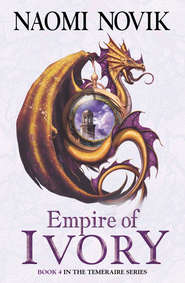
Полная версия:
Empire of Ivory

NAOMI NOVIK
Empire of Ivory


Copyright
This novel is entirely a work of fiction. The names, characters and incidents portrayed in it are the work of the author’s imagination. Any resemblance to actual persons, living or dead, events or localities is entirely coincidental.
HarperVoyager An imprint of HarperCollinsPublishers Ltd. 1 London Bridge Street London SE1 9GF
www.harpercollins.co.uk
First published in Great Britain by HarperCollinsPublishers Ltd. 2007
Copyright © Naomi Novik 2007
Cover design © HarperCollinsPublishers Ltd. 2014
Cover illustrations © Dominic Harman
Naomi Novik asserts the moral right to be identified as the author of this work
A catalogue copy of this book is available from the British Library
All rights reserved under International and Pan-American Copyright Conventions. By payment of the required fees, you have been granted the non-exclusive, non-transferable right to access and read the text of this ebook on screen. No part of this text may be reproduced, transmitted, down-loaded, decompiled, reverse engineered, or stored in or introduced into any information storage and retrieval system, in any form or by any means, whether electronic or mechanical, now known or hereinafter invented, without the express written permission of HarperCollins ebooks
HarperCollinsPublishers has made every reasonable effort to ensure that any picture content and written content in this ebook has been included or removed in accordance with the contractual and technological constraints in operation at the time of publication
Source ISBN: 9780007256730
Ebook Edition © FEBRUARY 2009 ISBN: 9780007318582
Version: 2017-01-09
Dedication
To Francesca,
may we always flee lions together
Contents
Title Page Copyright Dedication Part I Chapter One Chapter Two Chapter Three Chapter Four Chapter Five PART II Chapter Six Chapter Seven Chapter Eight Chapter Nine Chapter Ten Chapter Eleven Chapter Twelve PART III Chapter Thirteen Chapter Fourteen Chapter Fifteen Chapter Sixteen Chapter Seventeen Keep Reading Acknowledgements By the Same Author About the Publisher

PART I

Chapter One
‘Send up another, damn you, send them all up, at once if you have to,’ Laurence said savagely to poor Calloway, who did not deserve to be sworn at: the gunner was firing off the flares so quickly his hands were scorched black, skin cracking and peeling to bright red where some powder had spilled onto his fingers; he was not stopping to wipe them clean before setting each flare to the match.
One of the little French dragons darted in again, slashing at Temeraire’s side, and five men fell screaming as a piece of the makeshift carrying-harness unravelled. They vanished at once beyond the lantern-light and were swallowed up by the darkness; the long twisted rope of striped silk, a pillaged curtain, unfurled gently in the wind and billowed down after them, threads trailing from the torn edges. A moan went through the other Prussian soldiers still clinging desperately on to the harness, and after it low, angry mutterings in German.
Any gratitude the soldiers might have felt for their rescue from the siege of Danzig had since been exhausted: three days flying through icy rain, no food but what they had crammed into their pockets in those final desperate moments, no rest but a few hours snatched along a cold and marshy stretch of the Dutch coast, and now this French patrol harrying them all this last endless night. Men so terrified might do anything in a panic; many of them had still their small-arms and swords, and there were more than a hundred of them crammed aboard, to the less than thirty of Temeraire’s own crew.
Laurence swept the sky again with his glass, straining for a glimpse of wings, an answering signal. They were in sight of shore, the night was clear: through his glass he saw the gleam of lights dotting the small harbours all along the Scottish coast, and below heard the steadily increasing roar of the surf. Their flares ought to have been plain to see all the way to Edinburgh; yet no reinforcements had come, not a single courier-beast even to investigate.
‘Sir, that’s the last of them,’ Calloway said, coughing through the grey smoke that wreathed his head, the flare whistling high and away. The powder flash went off silently above their heads, casting the white scudding clouds into brilliant relief, reflecting from dragon scales in every direction: Temeraire all in black, the rest in gaudy colours muddied to shades of grey by the lurid blue light. The night was full of their wings: a dozen dragons turning their heads around to look back, their gleaming pupils narrowing; more coming on, all of them laden down with men, and the handful of small French patrol-dragons darting among them.
All seen in the flash of a moment, then the thunderclap crack and rumble sounded, only a little delayed, and the flare dying away drifted into blackness again. Laurence counted ten, and ten again; still there was no answer from the shore.
Emboldened, the French dragon came in once more. Temeraire aimed a swipe which would have knocked the little Pou-de-Ciel flat, but his attempt was very slow, for fear of dislodging any more of his passengers; their small enemy evaded with contemptuous ease and circled away to wait for his next chance.
‘Laurence,’ Temeraire said, looking round, ‘where is everyone? Victoriatus is in Edinburgh; he at least ought to have come. After all, we helped him, when he was hurt; not that I need help, precisely, against these little dragons,’ he added, straightening his neck with a crackle of popping joints, ‘but it is not very convenient to try and fight while we are carrying so many people.’
This was putting a braver face on the situation than it deserved: they could not very well defend themselves at all, and Temeraire was taking the worst of it, bleeding already from many small gashes along his side and flanks, which the crew could not bandage up, so cramped were they aboard.
‘Only keep everyone moving towards the shore,’ Laurence said; he had no better answer to give. ‘I cannot imagine the patrol will pursue us over land,’ he added, but doubtfully. He would never have imagined a French patrol could come so near to shore as this, either, without challenge; and how he should manage to disembark a thousand frightened and exhausted men under bombardment he did not like to contemplate.
‘I am trying; only they will keep stopping to fight,’ Temeraire said, wearily, and turned back to his work. Arkady and his rough band of mountain ferals found the small, stinging attacks maddening, and they kept trying to turn around mid-air and go after the French patrol-dragons; in their contortions they were flinging off more of the hapless Prussian soldiers than the enemy could ever have accounted for. There was no malice in their carelessness: the wild dragons were unused to men except as the jealous guardians of flocks and herds, and they did not think of their passengers as anything more than an unusual burden; but with malice or none, the men were dying all the same. Temeraire could only prevent them by constant vigilance, and now he was hovering in place over the line of flight, cajoling and hissing by turns, encouraging the others to hurry onwards.
‘No, no, Gherni,’ Temeraire called out, and dashed forward to swat at the little blue and white feral: she had dropped onto the very back of a startled French Chasseur-Vocifère: a courier beast of scarcely four tons, who could not bear up under even her slight weight and was sinking in the air despite the frantic beating of its wings. Gherni had already fixed her teeth in the French dragon’s neck and was now worrying it back and forth with savage vigour; meanwhile the Prussians clinging to her harness were all but drumming their heels on the heads of the French crew, crammed so tightly not a shot from the French side could fail of killing one of them.
In his efforts to dislodge her, Temeraire was left open, and the Pou-de-Ciel seized the fresh opportunity; this time daring enough to make an attempt at Temeraire’s back. His claws struck so near that Laurence saw the traces of Temeraire’s blood shining black on the curved edges as the French dragon lifted away again; his hand tightened on his pistol, uselessly.
‘Oh, let me, let me!’ Iskierka was straining furiously against the restraints keeping her lashed to Temeraire’s back. The infant Kazilik would soon be a force to reckon with; as yet, however, scarcely a month out of the shell, she was too young and unpracticed to be a serious danger to anyone beside herself. They had tried as best they could to secure her, with straps and chains and lecturing, but the last she roundly ignored, and though she had been but irregularly fed these last few days, she had added another five feet of length overnight: neither straps nor chains were proving of much use in restraining her.
‘Will you hold still, for all love?’ Granby said despairingly; he was throwing his own weight against the straps to try and pull her head down. Allen and Harley, the young lookouts stationed on Temeraire’s shoulders, had to go scrambling out of the way to avoid being kicked as Granby was dragged stumbling from side to side by her efforts. Laurence loosened his buckles and climbed to his feet, bracing his heels against the strong ridge of muscle at the base of Temeraire’s neck. He caught Granby by the harness-belt when Iskierka’s thrashing swung him by again, and managed to hold him steady, but all the leather was strung tight as violin-strings, trembling with the strain.
‘But I can stop him!’ she insisted, twisting her head sidelong as she tried to work free. Eager jets of flame were licking out from the sides of her jaws as she tried once again to lunge at the enemy dragon, but their Pou-de-Ciel attacker, small as he was, was still many times her size and too experienced to be frightened off by a little show of fire; he only jeered, backwinging to expose all of his speckled brown belly to her as a target in a gesture of insulting unconcern.
‘Oh!’ Iskierka coiled herself tightly with rage, the thin spiky protrusions all over her sinuous body jetting steam, and with a mighty heave reared up on her hindquarters. The straps jerked painfully out of Laurence’s grasp, and involuntarily he caught his hand back to his chest, numb fingers curling over instinctively. Granby had been dragged into mid-air and was dangling vainly from her thick neck band, while she let loose a torrent of flame: thin and yellow-white, so hot that the air about it seemed to twist and shrivel away. It made a fierce banner against the night sky.
But the French dragon had cleverly put himself before the wind, coming strong and from the east; now he folded his wings and dropped away, and the blistering flames were blown back against Temeraire’s flank. Temeraire, still scolding Gherni back into the line of flight, uttered a startled cry and jerked away while sparks scattered over the glossy blackness of his hide, perilously close to the carrying-harness of silk and linen and rope.
‘Verfluchtes Untier! Wir werden noch alle verbrennen,’ one of the Prussian officers yelled hoarsely, pointing at Iskierka, and fumbled with a shaking hand in his bandoleer for a cartridge.
‘Enough there; put up that pistol,’ Laurence roared at him through the speaking-trumpet. Lieutenant Ferris and a couple of the topmen hurriedly unlatched their harness-straps and let themselves down to wrestle it out of the officer’s hands. They could only reach the fellow by clambering over the other Prussian soldiers, however, and though too afraid to let go of the harness, the men were obstructing their passage in every other way, thrusting out elbows and hips with abrupt jerks, full of resentment and hostility.
Lieutenant Riggs was giving orders, distantly, towards the rear; ‘Fire!’ he shouted, clear over the increasing rumble among the Prussians; the handful of rifles spoke with bright powder-bursts, sulphurous and bitter. The French dragon made a little shriek and wheeled away, flying a little awkwardly: blood streaked in rivulets from a rent in its wing, where a bullet had by lucky chance struck one of the thinner patches around the joint and penetrated the hide.
The respite came a little late; some of the men were already clawing their way up towards Temeraire’s back, snatching at the greater security of the leather harness to which the aviators were hooked by their carabiner straps. But the harness could not take all their weight too, not so many of them; if the buckles stretched open, or some straps gave way, and the whole began to slide, it would entangle Temeraire’s wings and send them all plummeting into the ocean together.
Laurence loaded his pistols fresh and thrust them into his waistband, loosened his sword, and stood up again. He had willingly risked all their lives to rescue these men from a trap, and he meant to see them safely ashore if he could; but he would not see Temeraire endangered by their hysteric fear.
‘Allen, Harley,’ he said to the boys, ‘run across to the riflemen and tell Mr. Riggs: if we cannot stop them, they are to cut the carrying-harness loose, all of it; and be sure you keep latched on as you go. Perhaps you had better stay here with her, John,’ he added, when Granby made to come away with him. Iskierka was quiet for the moment, her enemy having quit the field, but she still coiled and recoiled herself in sulky restlessness, muttering in disappointment.
‘Oh, certainly! I should like to see myself do any such thing,’ Granby said, taking out his sword; he had foregone pistols since becoming Iskierka’s captain, to avoid the risk of handling open powder around her.
Laurence was too unsure of his ground to pursue an argument; Granby was not properly his subordinate any longer, and the more experienced aviator of the two of them, counting years aloft. Granby took the lead as they crossed Temeraire’s back, moving with the sureness only a boy trained up from the age of seven could have aloft; at each step Laurence handed forward his own lead-strap and let Granby lock it on to the harness for him, which he could do one-handed, that they might go more quickly.
Ferris and the topmen were still struggling with the Prussian officer in the midst of a thickening clot of men; they were disappearing from view under the violent press of bodies, only Martin’s yellow hair visible. The soldiers were near full riot, men beating and kicking at one another, thinking of nothing but an impossible escape; the knots of the carrying-harness were tightening, giving up more slack, so all the loops and bands of it hung loose and swinging with the thrashing, struggling men.
Laurence came on one of the soldiers, a young man, eyes wide and staring in his wind-reddened face and his thick moustache wet-tipped with sweat, trying to work his arm beneath the main harness, blindly, though the buckle was already straining open, and he would in a moment have slid wholly free.
‘Get back to your place!’ Laurence shouted, pointing to the nearest open loop of the carrying-harness, and thrusting the man’s hand away from the straps. Then his ears started ringing, a thick ripe smell of sour cherries flooded his nostrils as his knees folded beneath him. He put a hand to his forehead slowly, stupidly; it was wet. His own harness-straps were holding him, painfully tight against his ribs with all his weight pulling against them. The Prussian had struck him with a bottle; it had shattered, and the liquor was dripping down the side of his face.
Instinct rescued him; he put up his arm to take the next blow and pushed the broken glass back at the man’s face; the soldier said something in German and let go the bottle. They wrestled together a few moments more; then Laurence caught the man’s belt and heaved him up and away from Temeraire’s side. The soldier’s arms were spread wide, grasping at nothing; Laurence, watching, abruptly recalled himself, and at once he lunged out, reaching to his full length; but too late, and he came thumping heavily back against Temeraire’s side with empty hands; the soldier was already gone from sight.
His head did not hurt over much, but Laurence felt queerly sick and weak. Temeraire had resumed flying towards the coast, having rounded up the rest of the ferals at last, and the force of the wind was increasing. Laurence clung to the harness a moment, until the fit passed and he was able to make his hands work properly again. There were already more men clawing up: Granby was trying to hold them back, but they were overbearing him by sheer weight of numbers, even though struggling as much against one another as him. One of the soldiers grappling for a hold on the harness climbed too far out of the press; he slipped, landed heavily on the men below him, and carried them all away; as a tangled, many-limbed mass they fell into the slack loops of the carrying-harness, and the muffled wet noises of their joints and bones cracking sounded together like a roast chicken being wrenched hungrily apart.
Granby was hanging from his harness-straps, trying to get his feet planted again; Laurence crab-walked over to him and gave him a steadying arm. Below he could just make out the washy sea foam, pale against the black water; Temeraire was flying lower and lower as they neared the coast.
‘That damned Pou-de-Ciel is coming round again,’ Granby panted, as he got back his footing; the French had somehow stretched a dressing over the gash in the dragon’s wing, even if the great white patch of it was awkwardly placed and far larger than the injury made necessary. The dragon looked a little uncomfortable in the air, but he was coming on gamely nonetheless; they must have spotted Temeraire’s vulnerability. If the Pou-de-Ciel were able to catch the harness and drag it loose, it might deliberately finish what the soldiers had begun in their panic, and the chance of bringing down a heavy-weight, much less one as valuable as Temeraire, would surely tempt them to great risk.
‘We will have to cut the soldiers loose,’ Laurence said, low and wretched, and looked upwards, where the carrying-loops attached to the leather; but to send a hundred men and more to their deaths, scarce minutes from safety, he was not sure he could bear; or ever to meet General Kalkreuth again, having done it; some of the general’s own young aides were aboard Temeraire, and doing their best to keep the other men quiet.
Riggs and his riflemen were firing short, hurried volleys; the Pou-de-Ciel was keeping just out of range, waiting for the best moment to chance his attack. Then Iskierka sat up and blew out another stream of fire: Temeraire was flying ahead of the wind, so the flames were not turned against him, this time; but every man on his back had at once to throw himself flat to avoid the torrent, which burned out too quickly before it could reach the French dragon.
The Pou-de-Ciel at once darted in while the crew was distracted; Iskierka was gathering herself for another blow, and the riflemen could not get up again. ‘Christ,’ Granby said; but before he could reach her, a low rumble like fresh thunder sounded, and below them small round red mouths bloomed with smoke and powder-flashes: shore batteries, firing from the coast below. Illuminated in the yellow blaze of Iskierka’s fire, a twenty-four-pound ball of round-shot flew past them and took the Pou-de-Ciel in the chest; he folded around it like paper as it drove through his ribs, and crumpled out of the air, falling to the rocks below: they were over the shore, they were over the land, and thick-fleeced sheep were fleeing before them across the snow-matted grass.
The townspeople of the little harbour of Dunbar were alternately terrified at the descent of a whole company of dragons onto their quiet hamlet, and elated by the success of their new shore-battery, put into place scarcely two months ago and never before tried. Half-a-dozen courier-beasts driven off and one Pou-de-Ciel slain, became a Grand Chevalier and several Flammes-de-Gloire overnight, all hideously slain. The town could talk of nothing else, and the local militia strutted through the streets to general satisfaction.
The townspeople grew less enthusiastic, however, after Arkady had eaten four of their sheep; the other ferals had made only slightly less extravagant depredations, and Temeraire himself had seized upon a couple of cows, shaggy yellow-haired Highland cattle, sadly reported afterwards to be prize-winning, and devoured them to the hooves and horns.
‘They were very tasty,’ Temeraire said, apologetically; and turned his head aside to spit out some of the hair.
Laurence was not inclined to stint the dragons in the least, after their long and arduous flight, and on this occasion was perfectly willing to sacrifice his usual respect for civil property for their comfort. Some of the farmers made noises about payment, but Laurence did not mean to try and feed the bottomless appetites of the ferals out of his own pocket. The Admiralty might reach into theirs, if they had nothing better to do than sit before the fire and whistle while a battle was carrying on outside their windows, and men dying for lack of a little assistance. ‘We will not be a charge upon you for long. As soon as we hear from Edinburgh, I expect we will be called to the covert there,’ he said flatly, in reply to the protests. The horse-courier left at once.
The townspeople were more welcoming to the Prussians, most of them young soldiers pale and wretched after the flight. General Kalkreuth himself had been among these final refugees; he had to be let down from Arkady’s back in a sling, his face white and sickly under his beard. The local medical man looked doubtful, but cupped a basin full of blood, and had him carried away to the nearest farmhouse to be kept warm and dosed with brandy and hot water.
Other men were less fortunate. The harnesses, cut away, came down in filthy, tangled heaps weighted by corpses already turning green: some had been killed during the French attacks, others smothered by their own fellows in the panic, or dead of thirst, or plain terror. They buried sixty-three men out of a thousand that afternoon, some of them nameless, in a long and shallow grave laboriously pick-axed out of the frozen ground. The survivors were a ragged crew, clothes and uniforms inadequately brushed, faces still dirty, attending silently. Even the ferals, though they did not understand the language, perceived the ceremony, and sat on their haunches respectfully to watch from a distance.
Word arrived back from Edinburgh only a few hours later, but with orders so queer as to be incomprehensible. They began reasonably enough: the Prussians to be left behind in Dunbar and quartered on the town; and the dragons, as expected, were summoned to the city. But there was no invitation to General Kalkreuth or his officers to come along. On the contrary, Laurence was strictly adjured to bring no Prussian officers with him. As for the dragons, they were not permitted to enter the large and comfortable covert at all, not even Temeraire. Instead Laurence was ordered to leave them sleeping in the streets about the castle, and to report to the admiral in command in the morning.



